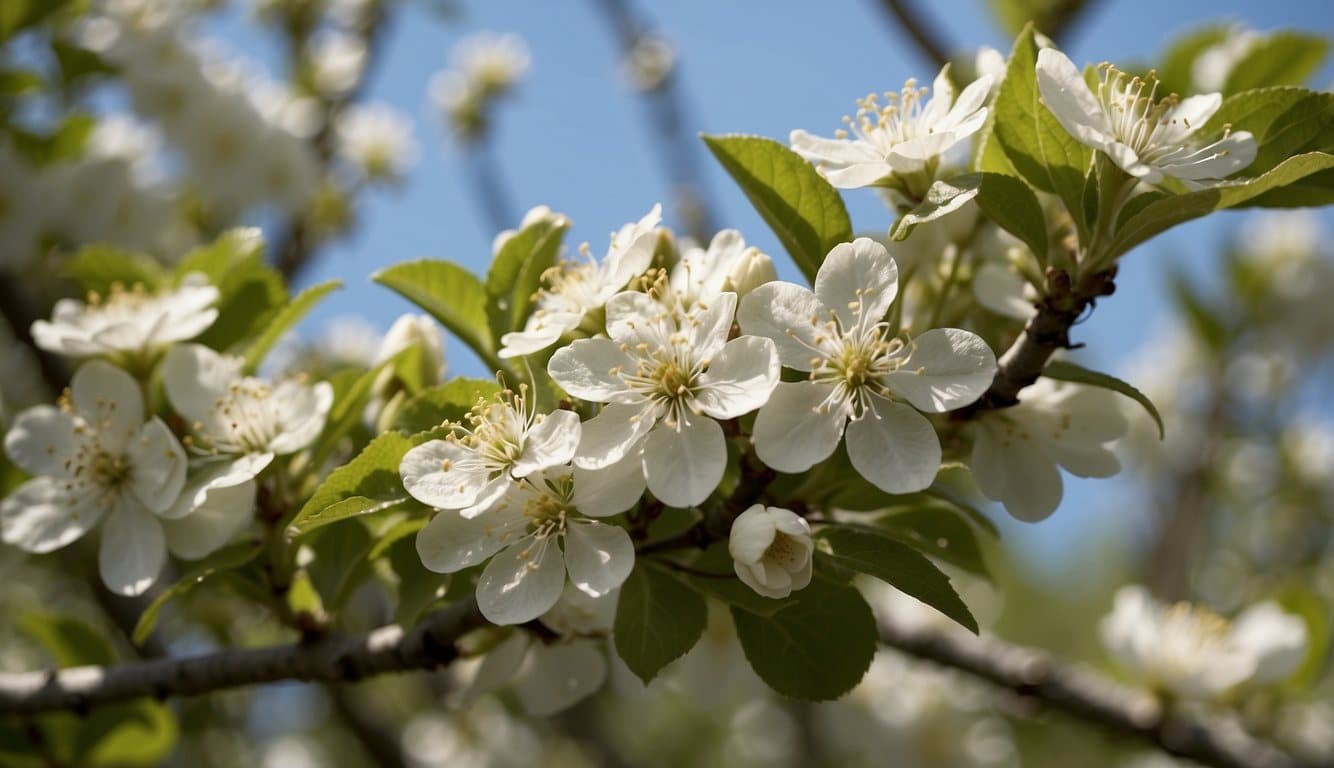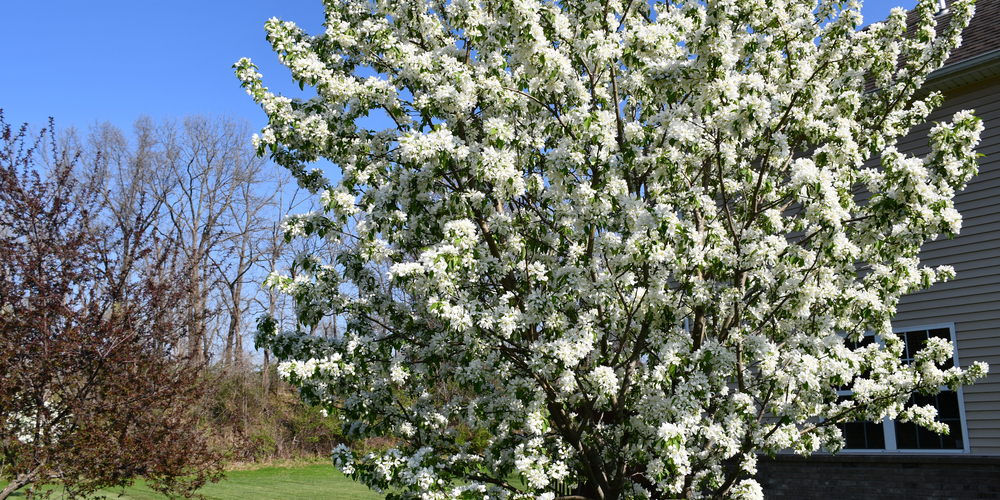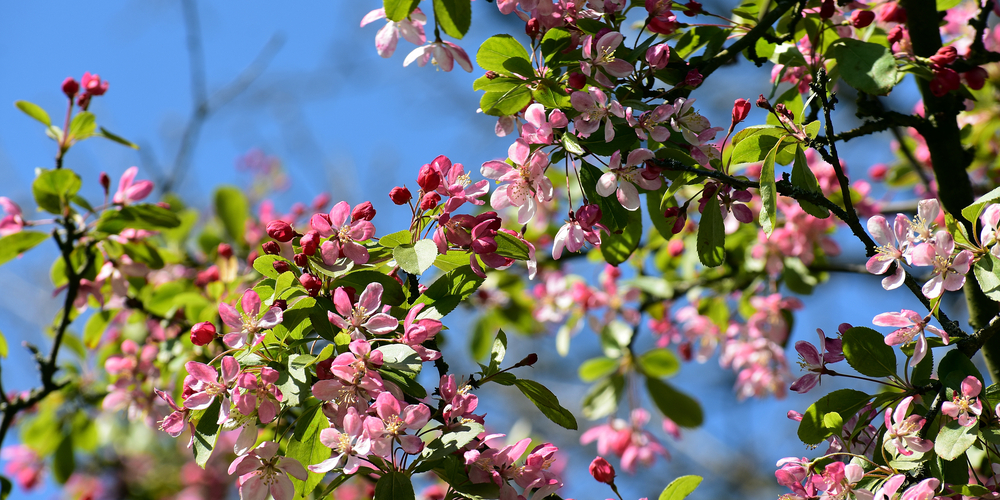Deciding to grow apple trees in your home orchard brings up an important consideration regarding pollination. You might wonder if your apple trees require a pollinator to bear fruit or if they are capable of self-pollination.
The truth is, while a few apple varieties can pollinate themselves, most apple trees need cross-pollination from another apple variety to produce a bountiful harvest.

Self-pollinating apple trees like Golden Delicious and Granny Smith are relatively rare and even these can benefit from cross-pollination to maximize their fruit production. Cross-pollination not only increases the quantity of apples but also contributes to better quality and size.
This is achieved when bees or other pollinators transfer pollen from flowers of one apple variety to another, fertilizing the ovules within the blossoms.
Recognizing the types of apple trees in your vicinity can also play a role in the success of your apple harvest, as certain varieties make excellent cross-pollinators for your trees.
If you are planting new trees, ensure that you select varieties that bloom around the same time for effective pollination. Achieving a good match in bloom times is key for apples to develop properly, as it ensures that pollen is available when the flowers are receptive.
Apple Tree Pollination Fundamentals
When dealing with apple trees, it’s essential to understand the intricacies of pollination that can affect your harvest. Different apple varieties have distinct pollination characteristics that you must consider.
Pollination Process
The pollination process in apple trees is crucial for fruit production. It involves the transfer of pollen from the anthers to the stigma, which can occur through various agents such as insects, wind, or human intervention.
Vibrant apple blossoms attract pollinators like honeybees, which are the most effective at transferring pollen between flowers. Without pollination, apple trees will not produce fruit.
Self-Pollinating Varieties
Some apple varieties are self-pollinating. This means they can fertilize their own flowers without the need for a different apple variety.
These self-fertile types include Golden Delicious, Granny Smith, Fuji, and Gala. It is important to note that even self-pollinating trees often benefit from cross-pollination as it can enhance fruit set and quality.
Cross-Pollination Requirements
Cross-pollination is necessary for most apple varieties to produce fruit. It requires the presence of a second, compatible apple tree within a reasonable distance for pollination to be successful.
Varieties should bloom at the same time to ensure that cross-pollination occurs. It’s advised to consult an apple pollination chart when selecting trees to ensure compatible flowering groups for your garden.
Cultivation Practices for Pollination
Effective pollination is paramount for the successful fruiting of apple trees. Your approach to cultivating these trees can significantly enhance their potential to pollinate and bear fruit.
Planting for Pollination
When planting apple trees, your main objective is to encourage cross-pollination for better yield. Here are the steps you should follow:
- Select Compatible Varieties: Consult an apple pollination chart to choose varieties that bloom at the same time and are compatible for cross-pollination.
- Proper Spacing: Ensure trees are planted within about 500 feet of each other to facilitate effective pollinator access.
- Include Self-Pollinating Cultivars: Though not all apple trees are self-fertile, including varieties like Golden Delicious can ensure fruit set even with limited cross-pollination partners.
Bee Attraction Strategies
Bees are the linchpins of apple tree pollination. You can attract them using the following tactics:
- Plant Bee-Friendly Flowers: Surround your apple trees with flowers that bloom at the same time to attract more pollinators.
- Limit Pesticide Use: If you must use pesticides, choose bee-friendly options and apply them at times when bees are less active, such as during early morning or late evening.
- Provide Water Sources: Bees need water for survival. Set up shallow water trays or birdbaths near the orchard to keep them hydrated and encourage longer visits to your apple trees.
Common Challenges in Apple Tree Pollination
Successful apple tree pollination can be affected by several factors that may prevent the transfer or viability of pollen.
Pollen Sterility
Your apple trees might produce pollen that is sterile and unable to fertilize a flower, leading to poor fruit set outcomes.
Particularly, some apple varieties are known for their less viable pollen or are considered self-incompatible—meaning they are unable to pollinate their own blossoms or those of closely related apple trees.
For instance, Jonagold and Mutsu are two varieties that have sterile pollen. To combat this issue, you’ll need to ensure that a compatible pollinizer is planted nearby to provide viable pollen.
Adverse Weather Conditions
Adverse weather conditions such as heavy rains, strong winds, or unseasonable frosts can be detrimental during flowering.
This can inhibit pollinators from reaching the flowers or wash away the pollen. Frost can damage the reproductive parts of the bloom itself, rendering them incapable of producing fruit.
You can monitor weather forecasts and, if possible, provide protection during these critical times or choose varieties with differing bloom times to extend the window for pollination.
Frequently Asked Questions
Understanding the pollination requirements of apple trees is crucial if you are interested in a fruitful harvest. These frequently asked questions will clarify common concerns about apple tree pollination.
Do apple trees require a pollination partner to bear fruit?
Most apple trees are not self-pollinating and require a pollination partner from a different apple variety for successful fruit production.
Which varieties of apple trees are considered self-fertile?
Some self-fertile apple varieties include Golden Delicious, Granny Smith, Fuji, and Gala, though even these benefit from cross-pollination.
Can a single apple tree produce fruit without any other apple trees nearby?
It is possible for a self-fertile apple tree to produce fruit on its own, but the yield and size of the apples are often better with a pollinator.
What are the recommended pollinators for apple tree varieties?
Certain varieties, like the Golden Delicious, are excellent pollinators for many other types of apple trees due to their bloom period and pollen compatibility.
How does the pollination process work for apple trees?
Bees and other insects transfer pollen from the flowers of one apple tree to those of another, leading to successful fruit set if the varieties are compatible.
Which factors affect the self-pollination capability of apple trees?
Factors such as variety, bloom time, and the presence of pollinators all play a role in the pollination process of apple trees.
Last update on 2025-06-06 / Affiliate links / Images from Amazon Product Advertising API




